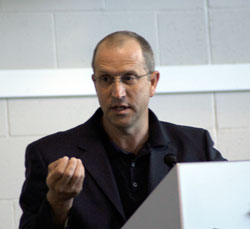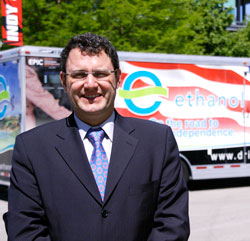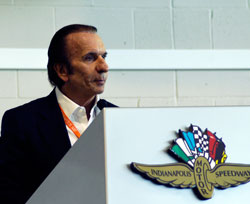What would Team Ethanol Driver Ryan Hunter-Reay do if he won the Indy 500? Check out this IndyStar.com video to find out:
NE Corn Fights Anti-Ethanol Campaigns

 The Nebraska Corn Board and Nebraska Corn Growers Association (NeCGA) announced today that they applaud the bipartisan group of Senators who have spoken out against the misinformation campaign that targets corn producers and the corn ethanol industry as being behind a rise in food prices.
The Nebraska Corn Board and Nebraska Corn Growers Association (NeCGA) announced today that they applaud the bipartisan group of Senators who have spoken out against the misinformation campaign that targets corn producers and the corn ethanol industry as being behind a rise in food prices.
The group of six Senators, organized by Iowa Senator Chuck Grassley (R), met in Washington D.C. to discuss many of the issues raised by ethanol critics and to help set the record straight on the benefits of biofuels. This is in response to the reported anti-ethanol campaign being brought about by the Grocery Manufacturers Association (GMA).
“Study after study has demonstrated that high fuel and energy prices are a major factor in higher food prices. If you take away ethanol, fuel prices will increase even more and food prices will follow,” said Jon Holzfaster, a corn and cattle producer from Paxton and chairman of the Nebraska Corn Board. “That is one of the important points the Senators made, and we couldn’t agree more.”
Randy Uhrmacher, president of NeCGA and a corn producer from Juniata, said that attempts to mislead the American public are unfortunate because they create turmoil in a food supply system that provides the safest and cheapest food in the world. “Food companies and farmers would be better off working together to find solutions to the real cause of higher food prices – our reliance on oil,” he said.
NeCGA and the Corn Board said they will continue providing the facts about food and fuel on their internet sites, www.NebraskaCorn.org and www.NeCGA.org, and in other communication efforts.
LifeLine Foods Just Happens to Sell Ethanol
 One of the largest snack suppliers in the U.S. is also the supplier of ethanol fuel for the Indy Racing League. Yup, LifeLine Foods is fueling and feeding the American public. Bill Becker, president and CEO of Lifeline, says that’s just the tip of the iceberg. LifeLine is investing in technology that will allow the company to do much more than just snack food and biofuel. Bill says his company can also remove fiber and protein from the same corn crop that it extracts snack foods and ethanol. These nutrients, he says, could potentially serve as a supplement to the world’s hungry. And that’s still not everything Bill says LifeLine can do with corn.
One of the largest snack suppliers in the U.S. is also the supplier of ethanol fuel for the Indy Racing League. Yup, LifeLine Foods is fueling and feeding the American public. Bill Becker, president and CEO of Lifeline, says that’s just the tip of the iceberg. LifeLine is investing in technology that will allow the company to do much more than just snack food and biofuel. Bill says his company can also remove fiber and protein from the same corn crop that it extracts snack foods and ethanol. These nutrients, he says, could potentially serve as a supplement to the world’s hungry. And that’s still not everything Bill says LifeLine can do with corn.
The story of how a small, farmer-owned company based out of St. Joseph, MO can provide snacks for major food companies, fuel one of the world’s most presitigious motor sports and more is quite a remarkable one. You can listen to my interview with Bill and hear his story about LifeLine here:
[audio:http://www.zimmcomm.biz/epic/becker-indy-08-summit.mp3]
Ethanol Supports the 6 “Fs”
 The discussion on ethanol should be about fuel plus food plus feed plus fibers plus fruits plus forests. At least, that’s what the president of UNICA thinks. Marco Jank spoke at yesterday’s Ethanol Summit and explained how ethanol has become not just a major fuel source in Brazil but also a stimulating proponent in many other industries, particularly food. Marcos adds that as technology continues to progress, the Brazilian ethanol industry will continue to grow. There’s no question. And, he says there’s no question that it will be the same for the U.S. In fact, he says the American ethanol industry is already growing at a faster rate than that of Brazil.
The discussion on ethanol should be about fuel plus food plus feed plus fibers plus fruits plus forests. At least, that’s what the president of UNICA thinks. Marco Jank spoke at yesterday’s Ethanol Summit and explained how ethanol has become not just a major fuel source in Brazil but also a stimulating proponent in many other industries, particularly food. Marcos adds that as technology continues to progress, the Brazilian ethanol industry will continue to grow. There’s no question. And, he says there’s no question that it will be the same for the U.S. In fact, he says the American ethanol industry is already growing at a faster rate than that of Brazil.
Marcos says, “technology is the solution” for combating a rising scarcity in oil. While he says that ethanol won’t ever become a big competitor with oil, he says it will and should become a leading alternative to oil. He urges leaders in the ethanol industry to appeal to the pulbic and encourage them to make biofuels a part of a worldwide solution to the oil crisis. Marcos says 100 countries have the potential of developing significant ethanol idustries, which in turn, allows for a “more deomocratic and less problematic” solution to the world’s energy needs.
I spoke with Marcos just after the summit. We talked about how ethanol has become a substantial fuel source in Brazil, why Marcos thinks the U.S. should open its doors to imported ethanol and the fuel’s virtually untapped potential in the U.S. You can listen to my interview here:
[audio:http://www.zimmcomm.biz/epic/jank-indy-08.mp3]
Ethanol Industry Fights Back
 The Renewable Fuels Association (RFA) is working hard to combat the campaign against ethanol by food manufacturers and petroleum companies which continues to increase. In this Ethanol Report podcast, President and CEO Bob Dinneen says they have hired new staff and opened a new office and he believes that in the end the facts will prevail.
The Renewable Fuels Association (RFA) is working hard to combat the campaign against ethanol by food manufacturers and petroleum companies which continues to increase. In this Ethanol Report podcast, President and CEO Bob Dinneen says they have hired new staff and opened a new office and he believes that in the end the facts will prevail.
You can subscribe to the twice-monthly “The Ethanol Report” by following this link.
Or you can listen to it on-line here: [audio:http://www.zimmcomm.biz/rfa/ethanol-report-13.mp3]
Ethanol: Official Fuel of Indy Racing and Indy Racing Legends
 Many consider Emerson Fittipaldi, a two-time Indy 500 champ, “a true King of the Brickyard.” But not only is Emerson an IRL legend, he’s a BIG supporter of ethanol. Perhaps even a “King of Ethanol.” Emerson is a Brazilian ethanol producer and spoke at yesterday’s Ethanol Summit hosted by General Motors.
Many consider Emerson Fittipaldi, a two-time Indy 500 champ, “a true King of the Brickyard.” But not only is Emerson an IRL legend, he’s a BIG supporter of ethanol. Perhaps even a “King of Ethanol.” Emerson is a Brazilian ethanol producer and spoke at yesterday’s Ethanol Summit hosted by General Motors.
The IRL racing legend told the story of his long history, not just with racing, but also racing with ethanol. Although the IRL fully switched from methanol to ethanol last year, Emerson is well acquainted with racing on the biofuel. At age 14, the Indy champ used ethanol in motorcycles and go-karts.
Emerson will get another chance to represent ethanol at the at the races. He is this year’s flex-fuel Corvette Z06 pace car driver. This is the first time the official Indy pace car will run on E85.
“The message of the pace car will be showing to the world that a passenger car even a high performance car like the corvette will run E85 and runs beautiful”,” Emerson said.
He added that the Indy Racing League itself is setting a worldwide example “of how a motor race can show the world, show the public how efficient the engines run with ethanol.” He called the IRL’s switch to 100 percent ethanol, “the endorsement of ethanol in the world through motor race.”
Just after the Summit I spoke with Fittipaldi one-on-one about racing with ethanol as a boy and being a part of ethanol’s growing success in Brazil today. You can listen to my interview here:
[audio:http://www.zimmcomm.biz/epic/fittipaldi-indy-08.mp3]
Evidence that Ethanol Works
 The ethanol industry in Brazil has been developing some major traction. Marcos Jank, President of UNICA, says the demand for ethanol in Brazil is now matching that of the demand for gasoline. He says ethanol is gaining ground and Brazil “won’t move back to gas.”
The ethanol industry in Brazil has been developing some major traction. Marcos Jank, President of UNICA, says the demand for ethanol in Brazil is now matching that of the demand for gasoline. He says ethanol is gaining ground and Brazil “won’t move back to gas.”
Marcos was one of seven speakers at today’s Ethanol Summit held at the Indianapolis Motor Speedway today. General Motors sponsored the event. The object of the Summit was to explore Brazil’s strong and sustained success with ethanol while also taking a look at where and how the U.S. ethanol industry has room to grow.
Marcos and Indy racing legend Emerson Fittipaldi – a Brazilian ethanol producer – highlighted a number of milestones the Brazilian ethanol industry has already attained:
- All fuel sold in Brazil contains a 20 to 25 percent blend of ethanol
- The unsubsidized ethanol industry offers a fuel that is on average one dollar below the price of gasoline
- Virtually all 33,000 gas pumps offer E100
- Just one percent of the 40 percent of arable land in Brazil is being used to produce sugarcane ethanol
- Forty-five percent of fuel for cars is from sugarcane
- Sugarcane ethanol production is 100 percent self-sufficient
- The food industry is growing faster than the ethanol industry
- Ninety percent of all new automobiles sold are flex-fuel automobiles
- One-hundred percent of GM vehicles produced in Brazil are flex-fuel
- Twenty percent of all cars are flex-fuel vehicles today
- Fifty percent of all cars will be flex-fuel vehicles by 2012
- Three percent of electricity is from sugarcane
- Honda and Yamaha are introducing flex-fuel motorcycles this year
First-ever IPO for Wind Energy Company Planned
 A Connecticut-based wind power company plans to be the first solely focused wind energy business in the U.S. to go public with an Initial Public Offering (IPO) on the Nasdaq later this year.
A Connecticut-based wind power company plans to be the first solely focused wind energy business in the U.S. to go public with an Initial Public Offering (IPO) on the Nasdaq later this year.
This story on CNNMoney.com says Noble Environmental Power Inc. plans to raise up to $375 million through the IPO under the symbol “NEPI”:
Noble Environmental currently operates 282 megawatts of electrical generating capacity in New York state and has 950 megawatts that it expects to bring online in 2008 and 2009. By the end of 2012, it expects to have 3,580 megawatts of capacity by expanding to other states, including Maine, Minnesota and Wyoming.
No other company focused exclusively on wind power generation has ever launched an IPO in the U.S., although there have been 17 such offerings in other parts of the world since 1995, according to data tracker Dealogic. But it was inevitable that a wind-related offering would come to market in the U.S., given the growth in the industry and a rise in private investments in the sector, says Randall Swisher, executive director of the American Wind Energy Association, a trade group that promotes wind power.
The article goes on to point out that Noble Environmental just started operating wind farms three months ago. But the company is putting its trust in the growing demand for renewable and clean energy sources, as well as hopes that legislation supporting wind power will be renewed by Congress.
Jobe: Don’t Blame Biofuels for Grocery Price Hike
 The head of the National Biodiesel Board is telling consumers not to buy what some grocers are selling: placing the blame for food price hikes on biofuels.
The head of the National Biodiesel Board is telling consumers not to buy what some grocers are selling: placing the blame for food price hikes on biofuels.
Joe Jobe is blasting the Grocery Manufacturers Association’s campaign to blame the green fuels for rising food costs:
 “The feeding frenzy on biofuels as the reason for higher food prices has got to stop. The GMA’s anti-biofuels campaign is not based on sound science, but rather on their desire to find an easy target for defending their profits,” Jobe said.
“The feeding frenzy on biofuels as the reason for higher food prices has got to stop. The GMA’s anti-biofuels campaign is not based on sound science, but rather on their desire to find an easy target for defending their profits,” Jobe said.
The NBB applauded Senators Charles Grassley (R-IA), Byron Dorgan (D-ND), John Thune (R-SD), Ben Nelson (D-NE), Kit Bond (R-MO), and Ken Salazar (D-CO), who joined today in sharp criticism of GMA’s public relations plan to discredit biofuels. They said the grocers’ attempts to blame biofuels for food price increases are not based on sound science, sound economics, or common sense. The senators expressed strong support for continued federal programs that encourage biofuel production and use.
The NBB also points to a U.S. Department of Agriculture economic analysis that says the real driving factors behind the skyrocketing prices in the grocery aisle are high energy prices, increasing global demand, drought and other factors… not biodiesel and ethanol. In addition, biodiesel can be made from non-food sources and waste, such as restaurant grease. And even with using soybeans, 80 percent of the soybean can still be used for animal feed or food.
The Greatest “Germ”ination
 The microbe that rotted Grandpa’s uniform and wreaked havoc on his equipment while fighting in the Pacific theater of World War II might be the same fungus that could help fill up your gas tank.
The microbe that rotted Grandpa’s uniform and wreaked havoc on his equipment while fighting in the Pacific theater of World War II might be the same fungus that could help fill up your gas tank.
This story from Biofuels Media Ltd. says that research by commercial and government scientists working with the U.S. Department of Energy Joint Genome Institute and Los Alamos National Laboratory has unlocked genes in Trichoderma reesei that could help produce biofuels:
 “The information generated from the genome of T. reesei provides us with a roadmap for accelerating research to optimize fungal strains for reducing the current prohibitively high cost of converting lignocellulose to fermentable sugars,” said Eddy Rubin, DOE JGI Director and one of the paper’s senior authors. “Improved industrial enzyme ‘cocktails’ from T. reseei and other fungi will enable more economical conversion of biomass from such feedstocks as the perennial grasses Miscanthus and switchgrass, wood from fast-growing trees like poplar, agricultural crop residues, and municipal waste, into next-generation biofuels. Through these incremental advances, we hope to eventually supplant the gasoline-dependent transportation sector of our economy with a more carbon-neutral strategy.”
“The information generated from the genome of T. reesei provides us with a roadmap for accelerating research to optimize fungal strains for reducing the current prohibitively high cost of converting lignocellulose to fermentable sugars,” said Eddy Rubin, DOE JGI Director and one of the paper’s senior authors. “Improved industrial enzyme ‘cocktails’ from T. reseei and other fungi will enable more economical conversion of biomass from such feedstocks as the perennial grasses Miscanthus and switchgrass, wood from fast-growing trees like poplar, agricultural crop residues, and municipal waste, into next-generation biofuels. Through these incremental advances, we hope to eventually supplant the gasoline-dependent transportation sector of our economy with a more carbon-neutral strategy.”
One of the commercial collaborators on the project calls this “a major step towards using renewable feedstocks for the production of fuels and chemicals.”

